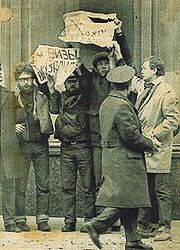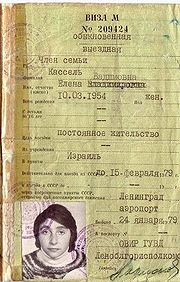
Refusenik (Soviet Union)
Encyclopedia


Soviet Union
The Soviet Union , officially the Union of Soviet Socialist Republics , was a constitutionally socialist state that existed in Eurasia between 1922 and 1991....
and other countries of the Eastern bloc
Eastern bloc
The term Eastern Bloc or Communist Bloc refers to the former communist states of Eastern and Central Europe, generally the Soviet Union and the countries of the Warsaw Pact...
. The term refusenik is derived from the "refusal" handed down to a prospective emigrant from the Soviet authorities.
Over time, "refusenik" has entered colloquial English usage for any type of protester.
History
A large number of Soviet Jews applied for exit visas to leave the Soviet Union, especially in the period following the 1967 Six-Day WarSix-Day War
The Six-Day War , also known as the June War, 1967 Arab-Israeli War, or Third Arab-Israeli War, was fought between June 5 and 10, 1967, by Israel and the neighboring states of Egypt , Jordan, and Syria...
. While some were allowed to leave, many were refused permission to emigrate, either immediately or after their cases would languish for years in the OVIR (ОВиР, "Отдел Виз и Регистрации", "Otdel Viz i Registratsii", English: Office of Visas and Registration), the MVD department responsible for exit visas. In many instances, the reason given for denial was that these persons had been given access, at some point in their careers, to information vital to Soviet national security
National security
National security is the requirement to maintain the survival of the state through the use of economic, diplomacy, power projection and political power. The concept developed mostly in the United States of America after World War II...
and could not now be allowed to leave.
During the Cold War
Cold War
The Cold War was the continuing state from roughly 1946 to 1991 of political conflict, military tension, proxy wars, and economic competition between the Communist World—primarily the Soviet Union and its satellite states and allies—and the powers of the Western world, primarily the United States...
, Soviet Jews were thought to be a security liability or possible traitors. To apply for an exit visa, the applicants (and often their entire families) would have to quit their jobs, which in turn would make them vulnerable to charges of social parasitism
Parasitism (social offense)
Social parasitism is a charge that is leveled against a group or class in society which is considered to be detrimental to the whole by analogy with biologic parasitism .-General concept:...
, a criminal offense.
Many Jews encountered institutional antisemitism which blocked their opportunities for advancement. Some government sectors were almost entirely off-limits to Jews. In addition, Soviet restrictions on religious education and expression prevented Jews from engaging in Jewish cultural and religious life. While these restrictions led many Jews to seek emigration, requesting an exit visa was itself seen as an act of betrayal by Soviet authorities. Thus, prospective emigrants requested permission to emigrate at great personal risk, knowing that an official refusal would often be accompanied by dismissal from work and other forms of social ostracism and economic pressure.
A leading proponent and spokesman of the refusenik movement during the 1970s was Natan Sharansky
Natan Sharansky
Natan Sharansky was born in Stalino, Soviet Union on 20 January 1948 to a Jewish family. He graduated with a degree in applied mathematics from Moscow Institute of Physics and Technology. As a child, he was a chess prodigy. He performed in simultaneous and blindfold displays, usually against...
. Sharansky's involvement with the Moscow Helsinki Monitoring Group helped to establish the struggle for emigration rights within the greater context of the human rights movement in the USSR. His arrest on charges of espionage and treason, and subsequent trial contributed to international support for the refusenik cause.
Refuseniks included Jews who desired to emigrate on religious grounds, Jews seeking to immigrate to Israel for Zionist
Zionism
Zionism is a Jewish political movement that, in its broadest sense, has supported the self-determination of the Jewish people in a sovereign Jewish national homeland. Since the establishment of the State of Israel, the Zionist movement continues primarily to advocate on behalf of the Jewish state...
aspirations, and relatively secular Jews desiring to escape continuous state-sponsored antisemitism. Also, large numbers of other ethnic groups tried to escape persecutions or desired to seek a better life, including Volga German
Volga German
The Volga Germans were ethnic Germans living along the River Volga in the region of southern European Russia around Saratov and to the south. Recruited as immigrants to Russia in the 18th century, they were allowed to maintain German culture, language, traditions and churches: Lutherans, Reformed,...
s attempting to leave for Germany
Germany
Germany , officially the Federal Republic of Germany , is a federal parliamentary republic in Europe. The country consists of 16 states while the capital and largest city is Berlin. Germany covers an area of 357,021 km2 and has a largely temperate seasonal climate...
and Armenians
Armenians
Armenian people or Armenians are a nation and ethnic group native to the Armenian Highland.The largest concentration is in Armenia having a nearly-homogeneous population with 97.9% or 3,145,354 being ethnic Armenian....
wanting to join their diaspora
Diaspora
A diaspora is "the movement, migration, or scattering of people away from an established or ancestral homeland" or "people dispersed by whatever cause to more than one location", or "people settled far from their ancestral homelands".The word has come to refer to historical mass-dispersions of...
.
The coming to power of Mikhail Gorbachev
Mikhail Gorbachev
Mikhail Sergeyevich Gorbachev is a former Soviet statesman, having served as General Secretary of the Communist Party of the Soviet Union from 1985 until 1991, and as the last head of state of the USSR, having served from 1988 until its dissolution in 1991...
in the Soviet Union in the mid-1980s and his policies of glasnost
Glasnost
Glasnost was the policy of maximal publicity, openness, and transparency in the activities of all government institutions in the Soviet Union, together with freedom of information, introduced by Mikhail Gorbachev in the second half of the 1980s...
and perestroika
Perestroika
Perestroika was a political movement within the Communist Party of the Soviet Union during 1980s, widely associated with the Soviet leader Mikhail Gorbachev...
, as well as a desire for better relations with the West, led to major changes, and most refuseniks were allowed to emigrate. With the dissolution of the Soviet Union
Dissolution of the Soviet Union
The dissolution of the Soviet Union was the disintegration of the federal political structures and central government of the Union of Soviet Socialist Republics , resulting in the independence of all fifteen republics of the Soviet Union between March 11, 1990 and December 25, 1991...
at the end of the decade, the term "otkaznik" largely passed into history.
See also
- Eastern Bloc emigration and defectionEastern Bloc emigration and defectionEastern Bloc emigration and defection was a point of controversy during the Cold War. After World War II, emigration restrictions were imposed by countries in the Eastern Bloc, which consisted of the Soviet Union and its satellite states in Eastern and Central Europe...
- Aliyah from the Soviet Union and post-Soviet states
- The dissolution of the Soviet Union and emigration to Israel
- Herman BranoverHerman BranoverHerman Branover is Russian Israeli physicist and Jewish educator. He is best known in the Jewish world as an inspiring author, translator, publisher, and educator. Branover is known in the world scientific community as the leading pioneer of the field of magnetohydrodynamics...
- DefectionDefectionIn politics, a defector is a person who gives up allegiance to one state or political entity in exchange for allegiance to another. More broadly, it involves abandoning a person, cause or doctrine to whom or to which one is bound by some tie, as of allegiance or duty.This term is also applied,...
- Lishkat HakesherLishkat HakesherNativ or officially Lishkat Hakesher or The Liaison Bureau, is an Israeli liaison organization that maintained contact with Jews living in the Eastern Bloc during the Cold War and encouraged aliyah, or immigration to Israel....
- Jackson-Vanik amendmentJackson-Vanik amendmentThe Jackson–Vanik amendment is a 1974 provision in United States federal law, intended to affect U.S. trade relations with countries with non-market economies that restrict freedom of emigration and other human rights...
- BalserosBalserosBalseros is a 2002 Spanish documentary co-directed by Carlos Bosch and Josep Maria Domènech about Cubans leaving during the Período Especial after the financial support of the former USSR stopped...
, Cuban citizens who are not legally allowed to migrate and cross to Florida in improvised boats. - Movement to Free Soviet JewryMovement to Free Soviet JewryThe Movement to Free Soviet Jewry was an international human rights campaign that advocated for the right of Jews in the Soviet Union to emigrate....
- Iosif BegunIosif BegunIosif Ziselovich Begun, sometimes spelled Yosef is a former Soviet refusenik, prisoner of conscience, human rights activist, author and translator....
Memoirs
- Natan Sharansky, Fear No EvilFear No Evil (book)Fear No Evil is a book by the Russian-Israeli activist and politician Natan Sharansky about his struggle to immigrate to Israel from the former Soviet Union. The book tells the story of the Jewish refuseniks in the 1970s USSR, his show trial on charges of espionage, incarceration by the KGB and...
. The Classic Memoir of One Man's Triumph over a Police State. ISBN 1-891620-02-9. - Chaim PotokChaim PotokChaim Potok was an American Jewish author and rabbi. Potok is most famous for his first book The Chosen, a 1967 novel which was listed on The New York Times’ best seller list for 39 weeks and sold more than 3,400,000 copies.-Biography :Herman Harold Potok was born in The Bronx, New York City, to...
, Gates of November: Chronicles of the Slepak Family ISBN 0-394588-67-3
Fiction
- David Shrayer-PetrovDavid Shrayer-PetrovDavid Shrayer-Petrov David Shrayer-Petrov David Shrayer-Petrov (Шраер-Петров, Давид, Russian-American novelist, poet, memoirist, translator, and medical scientist; best known for his novel about refuseniks, "Gerbert i Nelli" (Herbert and Nelly), his poetry and fiction about Russian-Jewish identity,...
, Herbert and Nelly (a novel, in Russian, abridged 1986; complete 1992, 2006). A saga of a refusenik family set in Moscow in the 1980s.
Documentary films
- In 2008 filmmaker Laura BialisLaura BialisLaura Bialis is an American-Israeli filmmaker. She grew up in Los Angeles and Santa Barbara, California and is a graduate of San Marcos High School and Stanford University...
released a documentary film, RefusenikRefusenik (2008 film)Refusenik is a 2008 documentary film by Laura Bialis that chronicles the struggle of Jews to emigrate from the Soviet Union in the 1960’s and 70’s...
, chronicling the human rights struggle of the Soviet refuseniks.

